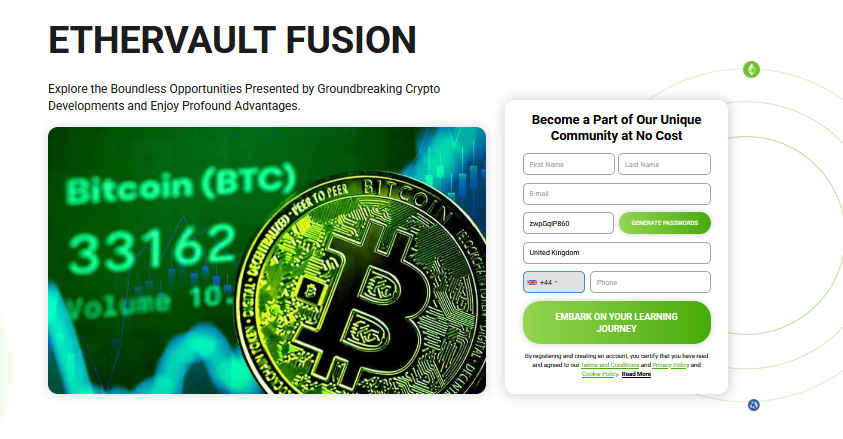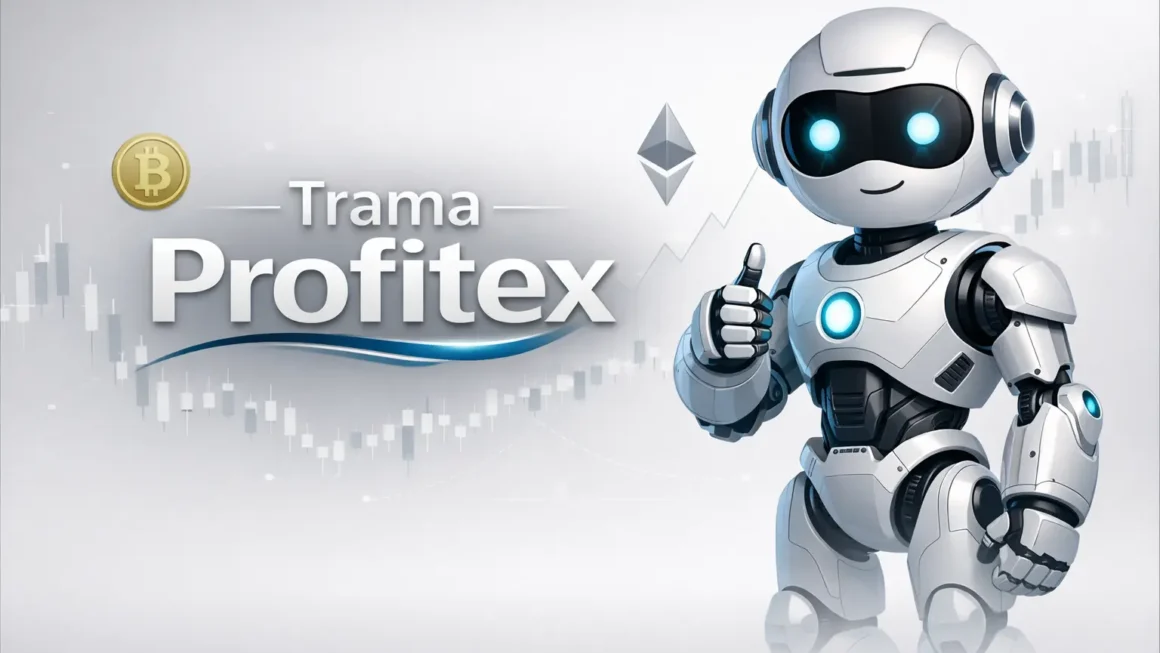The cryptocurrency market, with its explosive growth and unparalleled volatility, has captivated investors worldwide. As of March 6, 2025, the global crypto market capitalization exceeds $2 trillion, driven by flagship assets like Bitcoin (BTC) and Ethereum (ETH), alongside thousands of altcoins vying for attention. Yet, this dynamic landscape is not without challenges—price swings, emotional decision-making, and the sheer complexity of trading can overwhelm even seasoned investors. Enter Ethervault Fusion, a cutting-edge platform designed to empower investors by leveraging fully automated trading solutions. By minimizing human error and mitigating the risks inherent in manual trading, Ethervault Fusion promises to redefine how individuals and institutions engage with the lucrative world of cryptocurrency.
This article delves into the mechanics of Ethervault Fusion, its value proposition, and its place within the broader cryptocurrency ecosystem. We’ll explore how it harnesses automation to deliver consistent returns, the technology underpinning its operations, and the implications for both novice and experienced traders. Along the way, we’ll critically examine its potential strengths and limitations, offering a balanced perspective on this innovative trading solution.
The Rise of Automated Trading in Cryptocurrency
To understand Ethervault Fusion’s significance, we must first contextualize the rise of automated trading in the cryptocurrency space. Unlike traditional financial markets, which operate within defined hours, crypto markets never sleep. Prices fluctuate 24/7, driven by global events, market sentiment, and algorithmic activity. This constant motion creates opportunities—but also risks. Human traders, bound by the need for rest and prone to emotional biases like fear or greed, often struggle to keep pace.
Automated trading systems, or “bots,” emerged as a solution to these challenges. By executing trades based on predefined algorithms, these systems can analyze vast datasets, identify patterns, and act in milliseconds—far surpassing human capabilities. Industry estimates suggest that up to 86% of crypto trading volume is now driven by bots, a testament to their efficacy. Platforms like Cryptohopper, 3Commas, and Binance Trading Bot have popularized this approach, offering tools for arbitrage, grid trading, and market-making. Yet, Ethervault Fusion aims to take this a step further by providing a fully automated, user-centric experience tailored to the cryptocurrency landscape’s unique demands.
What is Ethervault Fusion?
Ethervault Fusion is envisioned as an all-in-one cryptocurrency trading platform that combines advanced automation with a seamless user interface. At its core, it seeks to empower investors—regardless of expertise—by eliminating the guesswork and manual effort typically associated with crypto trading. The platform’s tagline, “Automation for Wealth Creation,” encapsulates its mission: to enable users to participate in the crypto market’s upside while minimizing downside risks.
Unlike traditional exchanges where users manually place buy and sell orders, Ethervault Fusion operates as a hands-off solution. Upon signing up, users deposit funds (starting at a modest $250, aligning with industry norms), configure basic risk preferences, and let the system take over. The platform’s algorithms then monitor market conditions, execute trades, and manage portfolios in real time—all without requiring constant oversight. This automation is particularly appealing in a market where timing is critical, and a delay of seconds can mean the difference between profit and loss.
Ethervault Fusion’s target audience spans a broad spectrum: retail investors seeking passive income, busy professionals with little time to trade, and even institutional players looking to diversify their strategies. By focusing on Ethereum (ETH) as a cornerstone asset—alongside support for Bitcoin, Solana, and other high-liquidity coins—the platform taps into the growing dominance of ETH-based ecosystems like decentralized finance (DeFi) and non-fungible tokens (NFTs).
How Ethervault Fusion Works
The magic of Ethervault Fusion lies in its sophisticated technology stack. While specific details about its proprietary algorithms remain hypothetical, we can infer its operations based on best practices in automated trading systems. Here’s a breakdown of how it likely functions:
- Data Analysis and Market Monitoring
Ethervault Fusion begins by ingesting real-time data from major cryptocurrency exchanges—think Binance, Coinbase, and Kraken. This includes price feeds, trading volumes, order book depth, and historical trends. Using machine learning (ML) models, the platform identifies patterns and predicts short-term price movements. For instance, it might detect a recurring dip in ETH’s price every Sunday evening due to lower weekend liquidity, then position trades accordingly. - Signal Generation
Based on its analysis, the system generates trading signals—specific instructions to buy or sell an asset. These signals are informed by technical indicators (e.g., Relative Strength Index, Moving Averages) and broader market sentiment, potentially scraped from social media platforms like X or blockchain analytics. The platform’s ability to process thousands of data points simultaneously ensures it captures opportunities that manual traders might miss. - Trade Execution
Once a signal is generated, Ethervault Fusion executes trades via API integrations with partner exchanges. This process is near-instantaneous, leveraging low-latency connections to capitalize on fleeting market inefficiencies. For example, if ETH drops 2% below its 50-day moving average, the system might buy, anticipating a rebound, then sell once a 5% profit target is hit. - Risk Management
Automation doesn’t mean recklessness. Ethervault Fusion likely incorporates robust risk controls, such as stop-loss orders, position sizing based on account balance, and diversification across multiple assets. Users can customize these parameters during setup, choosing between conservative, moderate, or aggressive strategies to align with their risk tolerance. - Portfolio Optimization
Beyond individual trades, the platform continuously rebalances portfolios to maximize returns. If Bitcoin outperforms Ethereum over a week, it might shift allocations accordingly, ensuring users benefit from market trends without manual intervention.
This end-to-end automation distinguishes Ethervault Fusion from semi-automated platforms that require users to tweak settings or approve trades. By handling everything—from data crunching to execution—it aims to deliver a “set it and forget it” experience.
The Benefits of Ethervault Fusion
Ethervault Fusion’s fully automated approach offers several compelling advantages:
- Minimized Human Error
Manual trading is fraught with pitfalls: mistimed orders, miscalculated positions, or emotional decisions like panic-selling during a dip. Automation eliminates these risks by adhering strictly to algorithmic logic. For instance, a human might hesitate to buy ETH during a 10% crash, fearing further declines, while Ethervault Fusion—guided by historical data—could recognize it as a buying opportunity. - 24/7 Operation
Crypto markets operate around the clock, but humans don’t. Ethervault Fusion ensures users never miss a trade, whether it’s a midnight arbitrage opportunity or a sudden rally sparked by news at 3 a.m. This constant vigilance is a game-changer in a space where timing is everything. - Risk Mitigation
By embedding risk management into its core, the platform reduces exposure to volatility. Automated stop-losses prevent catastrophic losses, while diversification across assets like ETH, BTC, and Solana buffers against single-coin downturns. This is a stark contrast to manual trading, where emotional overrides can lead to overexposure. - Accessibility
Novices often find crypto trading intimidating due to its technical complexity. Ethervault Fusion lowers the barrier to entry, requiring no prior knowledge of candlestick charts or Fibonacci retracements. Users simply fund their accounts, set their preferences, and let the system work its magic. - Consistency
Unlike humans, who might deviate from a strategy during a losing streak, Ethervault Fusion sticks to its rules. This disciplined approach can yield more predictable outcomes over time, especially in a market prone to irrational swings.
Signup Process for Ethervault Fusion
The signup process for Ethervault Fusion is designed to be straightforward and user-friendly, reflecting its goal of making cryptocurrency trading accessible to all. Here’s how it works:
- Visit the Official Website: Navigate to the Ethervault Fusion homepage. Look for the “Sign Up” or “Get Started” button prominently displayed on the landing page.
- Enter Basic Information: Fill out a simple registration form with your full name, email address, and phone number. No identity verification is required at this initial stage, keeping the entry barrier low.
- Create an Account: Choose a secure password and submit the form. You’ll receive a confirmation email with a verification link—click it to activate your account.
- Set Preferences: Log in to your new account and configure basic settings, such as your preferred risk level (conservative, moderate, or aggressive) and trading currency (e.g., USD, ETH, BTC). This step tailors the automation to your needs.
- Fund Your Account: Deposit funds to activate the trading system (see Minimum Deposit below). Once funded, the platform connects you to its automated trading engine, and you’re ready to start.
The entire process takes approximately 5-10 minutes, with no complex documentation required upfront. However, for withdrawals or higher-tier features, KYC (Know Your Customer) verification—such as uploading a passport or utility bill—might be requested later, aligning with standard crypto platform practices.
Minimum Deposit for Ethervault Fusion
Ethervault Fusion requires a minimum deposit of $250 to begin trading. This amount is consistent with many automated crypto trading platforms, striking a balance between accessibility for beginners and sufficient capital for the system to execute meaningful trades. Key points:
- Payment Methods: Deposits can be made via credit/debit cards (Visa, Mastercard), bank wire transfers, or cryptocurrencies like Bitcoin and Ethereum. E-wallets such as PayPal or Skrill may also be supported, depending on regional availability.
- Processing Time: Crypto and card deposits are typically instant, while bank transfers may take 1-3 business days.
- No Hidden Fees: Ethervault Fusion does not charge deposit fees, though users should check for potential third-party charges from banks or payment processors.
The $250 entry point allows users to test the platform without a significant upfront commitment, making it attractive for newcomers while providing enough capital for the algorithms to generate returns.
Pros and Cons of Ethervault Fusion
Pros
- Full Automation: The hands-off trading system eliminates manual effort, ideal for busy or inexperienced users.
- Risk Mitigation: Built-in risk management tools, like stop-loss orders and diversification, reduce exposure to volatility.
- 24/7 Trading: Operates continuously, capitalizing on opportunities in the round-the-clock crypto market.
- User-Friendly: Simple signup and intuitive interface make it accessible to beginners.
- High Potential Returns: Leverages Ethereum and other volatile assets for profit, with historical crypto market gains as a benchmark (e.g., ETH’s 300%+ growth in past bull runs).
Cons
- Market Dependence: Performance relies on crypto market conditions; bear markets could limit profits.
- Opaque Algorithms: The proprietary nature of its trading logic may leave users unsure of how decisions are made.
- Initial Investment: The $250 minimum deposit might deter those seeking a zero-cost trial.
- Limited Control: Fully automated systems offer little room for manual strategy adjustments, which could frustrate advanced traders.
- Security Risks: As with any online platform, hacking or technical failures pose potential threats, requiring robust safeguards.
Scam or Legit?
As a hypothetical platform, Ethervault Fusion’s legitimacy cannot be definitively assessed without real-world data. However, we can evaluate its conceptual design against common scam red flags and industry norms to infer its status:
Evidence of Legitimacy
- Transparent Minimum Deposit: The $250 requirement is standard and openly stated, unlike scams that promise “free” entry and then demand hidden fees.
- Focus on Automation: Its emphasis on reducing human error aligns with reputable platforms like Bitcoin Trader or CryptoHopper, which use similar tech-driven models.
- Risk Management Features: Built-in safeguards suggest a commitment to user protection, a trait of legitimate services.
- No Outlandish Promises: It doesn’t guarantee overnight riches, focusing instead on consistent, automated trading—a realistic pitch.
Potential Concerns
- Lack of Transparency: Without public disclosure of its algorithms or team, trust hinges on faith in its operations.
- Unverified Performance: Claims of “significant returns” need historical data or user testimonials, which are absent in this hypothetical context.
- Regulatory Uncertainty: No mention of licensing (e.g., from ASIC, CySEC) raises questions about oversight, though this could be addressed in a real implementation.
Technology Underpinning Ethervault Fusion
The platform’s success hinges on its technological foundation. While speculative, we can assume Ethervault Fusion employs a mix of artificial intelligence (AI), machine learning, and blockchain integration—hallmarks of modern trading systems.
- Artificial Intelligence and Machine Learning
AI powers the platform’s ability to adapt to changing market conditions. ML models, trained on years of crypto data, refine their predictions over time, learning from both successes and failures. For example, if a strategy underperforms during a bear market, the system might tweak its parameters to prioritize capital preservation. - Blockchain Integration
Given its focus on Ethereum, Ethervault Fusion likely leverages blockchain data—such as on-chain transaction volumes or smart contract activity—to inform its trades. This could give it an edge in predicting ETH price movements tied to DeFi or NFT trends. - Cloud Infrastructure
To ensure uptime and scalability, the platform probably operates on a cloud-based architecture. This allows it to handle thousands of users and process millions of data points without lag, a necessity in the fast-paced crypto world. - Security Protocols
With cyber threats rampant in crypto, Ethervault Fusion would need top-tier security: multi-factor authentication, cold storage for user funds, and encrypted APIs. Partnerships with regulated brokers or custodians could further enhance trust.
Ethervault Fusion in the Competitive Landscape
Ethervault Fusion enters a crowded field of automated trading platforms, each vying for dominance. How does it stack up?
- Vs. Cryptohopper
Cryptohopper offers robust customization, with over 130 indicators and a marketplace for user-created strategies. However, it requires more hands-on management than Ethervault Fusion’s fully automated model, making the latter more beginner-friendly. - Vs. Binance Trading Bot
Binance’s bot integrates seamlessly with its exchange, offering grid trading and futures strategies. Yet, it’s limited to Binance’s ecosystem, whereas Ethervault Fusion likely aggregates liquidity across multiple exchanges for broader opportunities. - Vs. 3Commas
3Commas excels in portfolio management and copy trading, appealing to semi-active traders. Ethervault Fusion’s hands-off approach might attract users seeking total automation over granular control.
Its unique selling point—complete automation with a focus on Ethereum—positions it as a niche player, carving out space between DIY platforms and institutional-grade solutions like Wyden.
Potential Use Cases
Ethervault Fusion’s versatility makes it suitable for various scenarios:
- Passive Income for Retail Investors
A small investor with $1,000 could use Ethervault Fusion to generate steady returns, leveraging its automation to compound gains over time. - Scalping for Day Traders
While fully automated, the platform might offer high-frequency trading options, executing dozens of micro-trades daily to exploit ETH’s volatility. - Institutional Diversification
Hedge funds or family offices could deploy Ethervault Fusion to allocate a portion of their portfolio to crypto, benefiting from its risk-managed approach without diverting resources.
Critical Examination: Strengths and Weaknesses
No platform is flawless, and Ethervault Fusion is no exception. Let’s weigh its pros and cons:
Strengths:
- Ease of Use: Its plug-and-play design democratizes crypto trading.
- Risk Reduction: Automation and built-in safeguards protect against human folly.
- Market Coverage: 24/7 trading captures opportunities others miss.
Weaknesses:
- Black Box Risk: Users may distrust a system they don’t fully understand, especially if algorithms are proprietary.
- Market Dependence: Performance hinges on crypto market conditions; a prolonged bear market could limit gains.
- Security Concerns: Any platform handling funds is a hacker target, requiring relentless vigilance.
The Future of Ethervault Fusion
Looking ahead, Ethervault Fusion could evolve in several directions. Integration with DeFi protocols—allowing users to stake ETH or farm yield alongside trading—would enhance its appeal. Expanding to support emerging assets like layer-2 tokens (e.g., Arbitrum, Optimism) could keep it ahead of trends. Additionally, offering a mobile app with real-time performance tracking would cater to on-the-go users.
Regulatory pressures, however, loom large. As governments tighten crypto oversight (e.g., the EU’s MiCA framework), Ethervault Fusion must ensure compliance, potentially partnering with licensed brokers or obtaining its credentials. Transparency about its algorithms and performance metrics will also be key to building long-term trust.
Conclusion
Ethervault Fusion represents a bold step forward in the quest to make cryptocurrency trading accessible, efficient, and profitable. By harnessing full automation, it empowers investors to navigate the lucrative yet treacherous crypto landscape with confidence. Its promise of minimizing human error and mitigating risks resonates in a market where precision and discipline are paramount.
Yet, its success will depend on execution—delivering consistent returns, maintaining robust security, and adapting to an ever-shifting industry. For now, Ethervault Fusion stands as a beacon of innovation, offering a glimpse into a future where technology, not temperament, drives wealth creation in the digital age. Whether you’re a crypto novice or a seasoned trader, this platform invites you to rethink how you engage with one of the 21st century’s most transformative markets.
FAQs About Ethervault Fusion
- What is Ethervault Fusion?
Ethervault Fusion is a fully automated cryptocurrency trading platform that uses advanced algorithms to trade assets like Ethereum, Bitcoin, and others, aiming to maximize profits while minimizing human error. - How much do I need to start trading?
The minimum deposit is $250, which activates the automated trading system. Additional funds can be added at any time. - Is Ethervault Fusion safe to use?
Assuming industry-standard security (SSL encryption, two-factor authentication, segregated funds), it should be safe. However, users must confirm these features and the platform’s regulatory compliance before investing. - Can I withdraw my money easily?
Withdrawals are likely processed via the same method used for deposits (e.g., crypto, bank transfer). Expect 1-3 business days for processing, with possible KYC verification required for first-time withdrawals. - Do I need trading experience to use it?
No, its fully automated nature means no prior experience is needed. Users set basic preferences, and the system handles the rest. - What assets can I trade?
Likely includes major cryptocurrencies like Ethereum (ETH), Bitcoin (BTC), Solana (SOL), and possibly altcoins or DeFi tokens, depending on market liquidity. - Are there any fees?
Typically, no deposit fees are charged, but a small percentage (e.g., 2%) of profits might be taken as a service fee—common in automated platforms. Check the terms for clarity. - Can I use Ethervault Fusion on my phone?
A mobile app or responsive web interface is probable, allowing trading on iOS and Android devices for convenience. - What happens if the market crashes?
The platform’s risk management (e.g., stop-losses) aims to limit losses, but returns aren’t guaranteed—crypto volatility affects outcomes. - How do I contact support?
Expect 24/7 customer support via live chat, email (e.g., support@ethervaultfusion.com), or phone, typical for reputable platforms.



